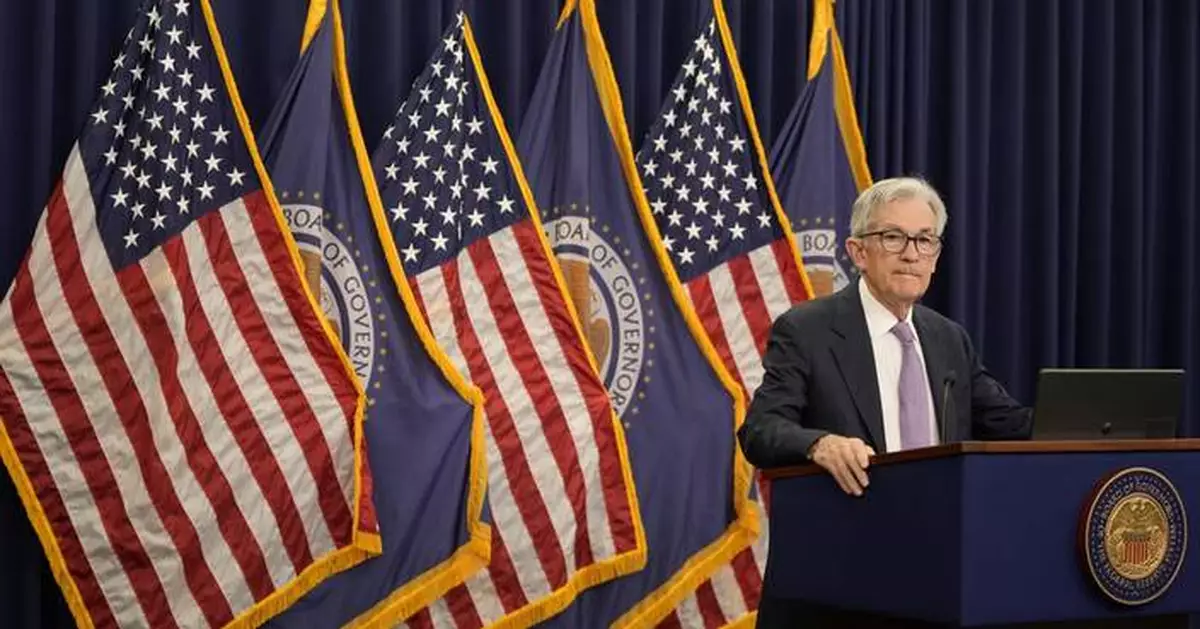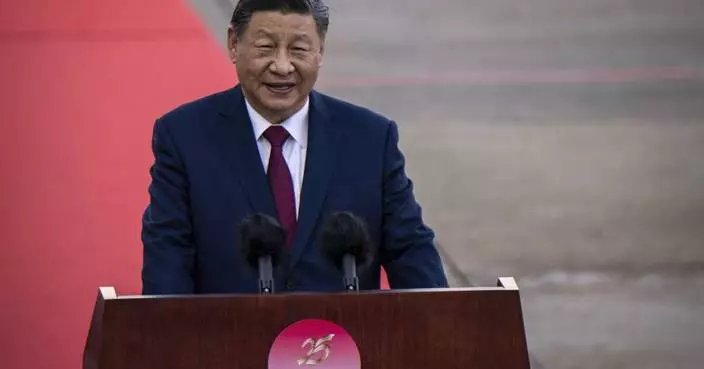WASHINGTON (AP) — Federal Reserve officials on Wednesday will likely signal a slower pace of interest rate cuts next year compared with the past few months, which would mean that Americans might enjoy only slight relief from still-high borrowing costs for mortgages, auto loans and credit cards.
The Fed is set to announce a quarter-point cut to its benchmark rate, from about 4.6% to roughly 4.3%. The latest move would follow a larger-than-usual half-point rate cut in September and a quarter-point reduction in November.
Wednesday's meeting, though, could mark a shift to a new phase in the Fed's policies: Instead of a rate cut at each meeting, the Fed is more likely to cut at every other meeting — at most. The central bank's policymakers may signal that they expect to reduce their key rate just two or three times in 2025, rather than the four rate cuts they had envisioned three months ago.
So far, the Fed has explained its moves by describing them as a “recalibration” of the ultra-high rates that were intended to tame inflation, which reached a four-decade high in 2022. With inflation now much lower — at 2.3% in October, according to the Fed's preferred gauge, down from a peak of 7.2% in June 2022 — many Fed officials argue that interest rates don't need to be so high.
But inflation has remained stuck above the Fed's 2% target in recent months while the economy has continued to grow briskly. On Tuesday, the government's monthly report on retail sales showed that Americans, particularly those with higher incomes, are still willing to spend freely. To some analysts, those trends raise the risk that further rate cuts could deliver an excessively strong boost to the economy and, in doing so, keep inflation elevated.
On top of that, President-elect Donald Trump has proposed a range of tax cuts — on Social Security benefits, tipped income and overtime income — as well as a scaling-back of regulations. Collectively, these moves could stimulate growth. At the same time, Trump has threatened to impose a variety of tariffs and to seek mass deportations of migrants, which could accelerate inflation.
Chair Jerome Powell and other Fed officials have said they won't be able to assess how Trump's policies might affect the economy or their own rate decisions until more details are made available and it becomes clearer how likely it is that the president-elect's proposals will actually be enacted. Until then, the outcome of the presidential election has mostly heightened the uncertainty surrounding the economy.
Either way, it appears unlikely that Americans will enjoy much lower borrowing costs anytime soon. The average 30-year mortgage rate was 6.6% last week, according to mortgage giant Freddie Mac, below the peak of 7.8% reached in October 2023. But the roughly 3% mortgage rates that existed for nearly a decade before the pandemic aren't going to return in the foreseeable future.
Fed officials have underscored that they are slowing their rate reductions as their benchmark rate nears a level that policymakers refer to as “neutral” — the level that neither spurs nor hinders the economy.
“Growth is definitely stronger than we thought, and inflation is coming in a little higher,” Powell said recently. “So the good news is, we can afford to be a little more cautious as we try to find neutral."
Most other central banks around the world are also cutting their benchmark rates. Last week, the European Central Bank lowered its key rate for the fourth time this year to 3% from 3.25%, as inflation in the 20 countries that use the euro has fallen to 2.3% from a peak of 10.6% in late 2022.
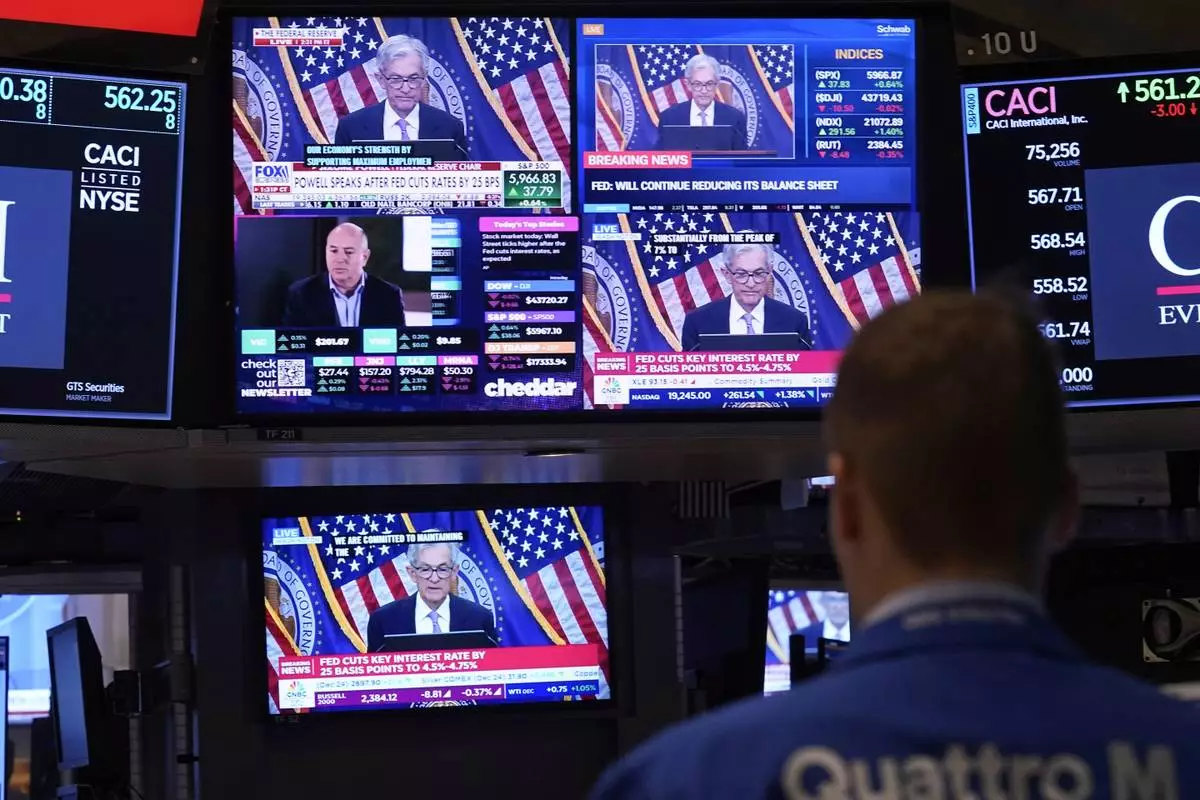
FILE - Comments by Federal Reserve Chair Jerome Powell appear on a bank of screens on the floor of the New York Stock Exchange, Nov. 7, 2024, in New York. (AP Photo/Richard Drew, File)
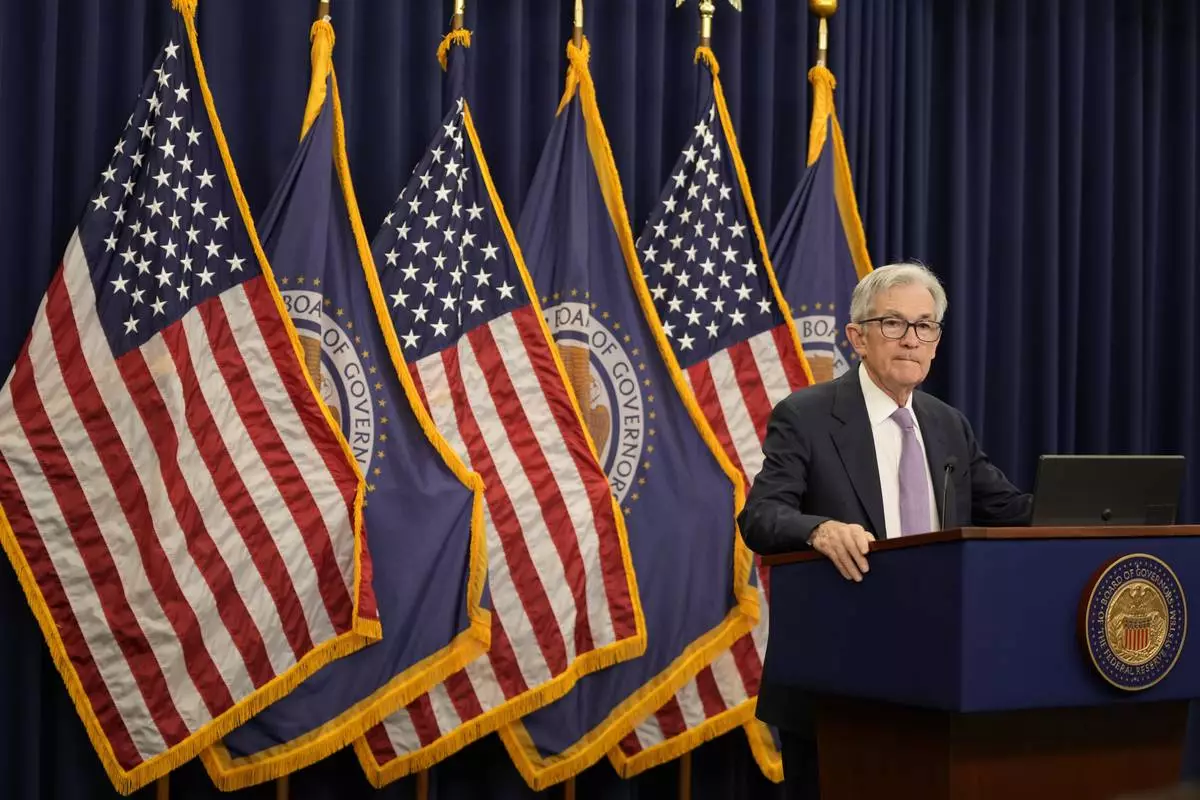
File - Federal Reserve Board Chairman Jerome Powell speaks during a news conference at the Federal Reserve in Washington, Nov. 7, 2024. (AP Photo/Mark Schiefelbein, File)
BANGKOK (AP) — Japanese automakers Nissan Motor Corp. and Honda Motor Co. confirmed Wednesday that they are discussing closer collaboration but denied reports they have decided on a merger.
Nissan’s share price soared nearly 24% in Tokyo after reports citing unnamed sources said it might merge with Honda to form the world’s third-largest automaking group. Honda’s share price fell as much as 3%. Nissan alliance member Mitsubishi Motors Corp. is also part of the talks.
Trading in Nissan’s shares was suspended but then resumed after the companies jointly issued a statement saying they were “considering various possibilities for future collaboration, but no decisions have been made.”
The ascent of Chinese automakers is rattling the industry at a time when manufacturers are struggling to shift from fossil fuel-driven vehicles to electrics. Relatively inexpensive EVs from China's BYD, Great Wall and Nio are eating into the market shares of U.S. and Japanese car companies in China and elsewhere.
Japanese automakers have lagged behind big rivals in EVs and are now trying to cut costs and make up for lost time.
Nissan, Honda and Mitsubishi announced in August that they will share components for electric vehicles like batteries and jointly research software for autonomous driving to adapt better to dramatic changes in the auto industry centered around electrification. A preliminary agreement between Honda, Japan's second-largest automaker, and Nissan, third largest, was announced in March.
A merger could result in a behemoth worth about $55 billion based on the market capitalization of all three automakers.
Joining forces would help the smaller Japanese automakers add scale to compete with Japan's market leader Toyota Motor Corp. and with Germany’s Volkswagen AG. Toyota itself has technology partnerships with Japan's Mazda Motor Corp. and Subaru Corp.
Nissan said last month that it was slashing 9,000 jobs, or about 6% of its global work force, and reducing global production capacity by 20% after reporting a quarterly loss of 9.3 billion yen ($61 million).
Earlier this month it reshuffled its management and its chief executive, Makoto Uchida, took a 50% pay cut to take responsibility for the financial woes, saying Nissan needed to become more efficient and respond better to market tastes, rising costs and other global changes.
Fitch Ratings recently downgraded Nissan's credit outlook to “negative,” citing worsening profitability, partly due to price cuts in the North American market. But it noted that it has a strong financial structure and solid cash reserves that amounted to 1.44 trillion yen ($9.4 billion).
Nissan's share price has fallen to the point where it is considered something of a bargain. A report in the Japanese financial magazine Diamond said talks with Honda gained urgency after the Taiwan maker of iPhones Hon Hai Precision Industry Co., better known as Foxconn, began exploring a possible acquisition of Nissan as part of its push into the EV sector.
The company has struggled for years following a scandal that began with the arrest of its former chairman Carlos Ghosn in late 2018 on charges of fraud and misuse of company assets, allegations that he denies. He eventually was released on bail and fled to Lebanon.
Honda reported its profits slipped nearly 20% in the first half of the April-March fiscal year from a year earlier, as sales suffered in China.
Toyota made 11.5 million vehicles in 2023, while Honda rolled out 4 million and Nissan produced 3.4 million. Mitsubishi Motors made just over 1 million. Even after a merger Toyota would remain the leading Japanese automaker.
All the global automakers are facing potential shocks if President-elect Donald Trump follows through on threats to raise or impose tariffs on imports of foreign products, even from allies like Japan and neighboring countries like Canada and Mexico. Nissan is among the major car companies that have adjusted their supply chains to include vehicles assembled in Mexico.
Meanwhile, analysts say there is an “affordability shift” taking place across the industry, led by people who feel they cannot afford to pay nearly $50,000 for a new vehicle. In American, a vital market for companies like Nissan, Honda and Toyota, that's forcing automakers to consider lower pricing, which will eat further into industry profits.
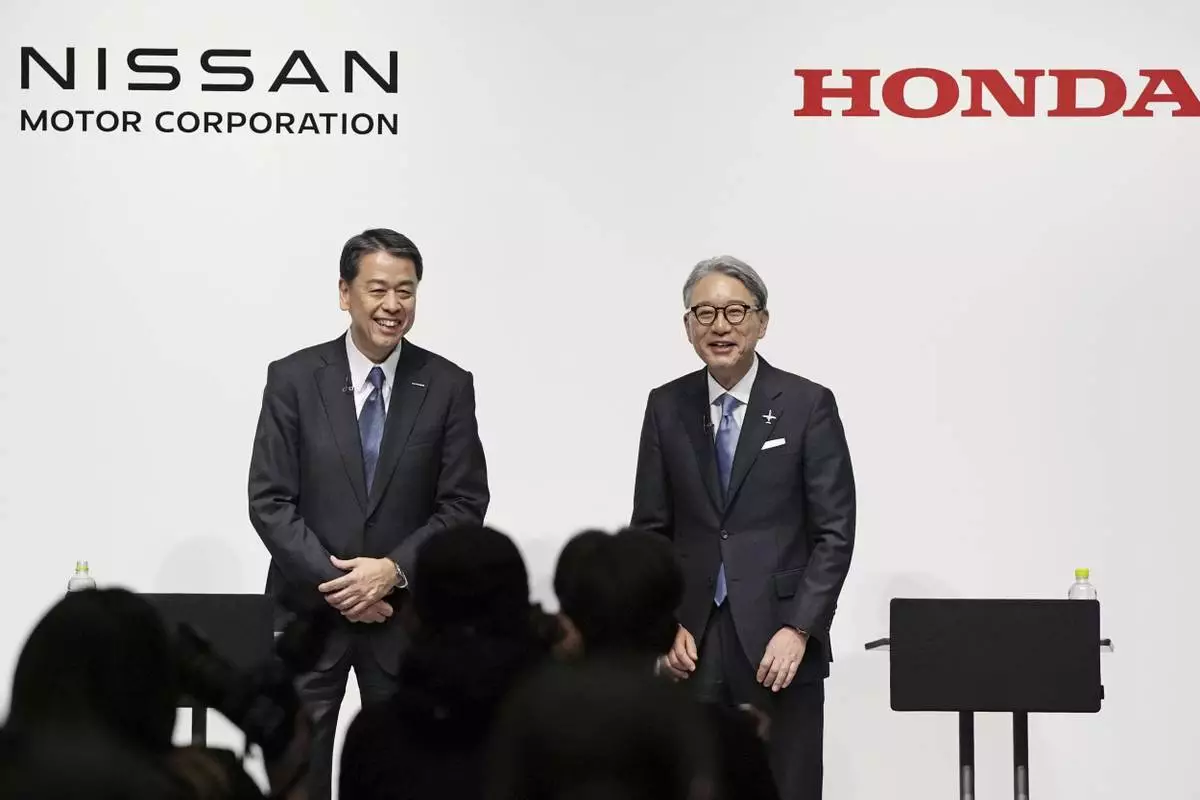
FILE - Nissan Chief Executive Makoto Uchida, left, and Honda President Toshihiro Mibe attend a joint news conference in Tokyo, Friday, March 15, 2024. (Kyodo News via AP, File)
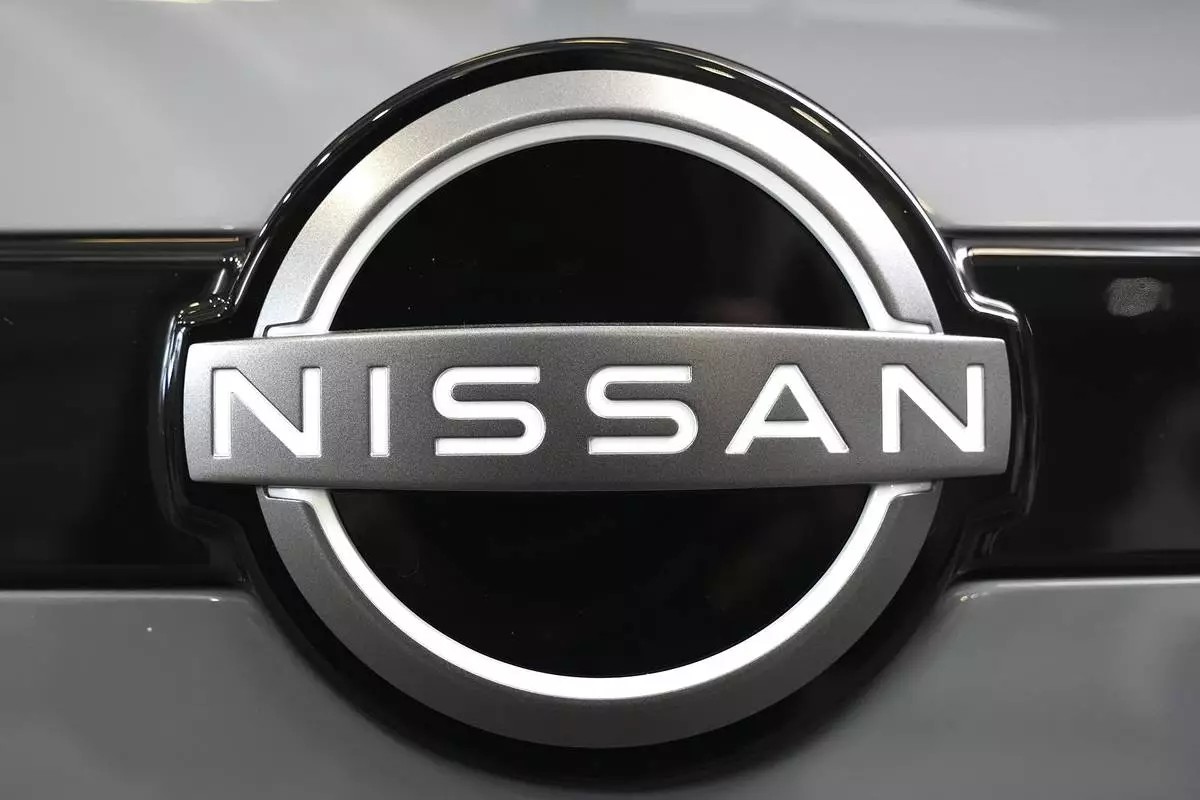
FILE - A Nissan logo is displayed on a Nissan Pathfinder SUV at the Pittsburgh International Auto Show in Pittsburgh, Feb. 15, 2024. (AP Photo/Gene J. Puskar, File)




